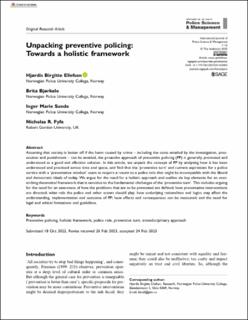Unpacking preventive policing: Towards a holistic framework
Peer reviewed, Journal article
Published version
Permanent lenke
https://hdl.handle.net/11250/3063809Utgivelsesdato
2023Metadata
Vis full innførselSamlinger
Originalversjon
10.1177/14613557231163403Sammendrag
Assuming that society is better off if the harm caused by crime – including the costs entailed by the investigation, prosecution and punishment – can be avoided, the proactive approach of preventive policing (PP) is generally promoted and understood as a good and effective solution. In this article, we unpack the concept of PP by analysing how it has been understood and practised across time and space, and find that the ‘preventive turn’ and current aspirations for a police service with a ‘preventative mindset’ seem to require a return to a police role that might be incompatible with the liberal and democratic ideals of today. We argue for the need for a holistic approach and outline six key elements for an overarching theoretical framework that is sensitive to the fundamental challenges of the ‘preventive turn’. This includes arguing for the need for an awareness of how the problems that are to be prevented are defined; how preventative interventions are directed; what role the police and other actors should play; how underlying rationalities and logics may affect the understanding, implementation and outcome of PP; how effects and consequences can be measured; and the need for legal and ethical limitations and guidelines.
